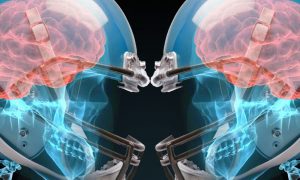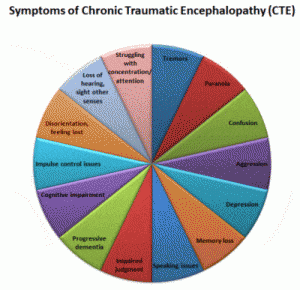 Over fall break this year, I had the opportunity to travel to North Carolina to visit the UNC Graduate School and shadow a Neuropsychologist at the UNC Rehabilitation Clinic. That specific facility has the opportunity to see many patients that are retired NFL players, as funded by the NFL Players Association.
Over fall break this year, I had the opportunity to travel to North Carolina to visit the UNC Graduate School and shadow a Neuropsychologist at the UNC Rehabilitation Clinic. That specific facility has the opportunity to see many patients that are retired NFL players, as funded by the NFL Players Association.
 The experiences I had at UNC contribute to my knowledge on this week’s topic: Concussions. Many people understand that hitting your head probably isn’t the best thing to do. But fewer understand how serious concussions may be, especially in the case of repeated injury. At the UNC Rehabilitation Clinic, the Neuropsychologists see many retired NFL players because of a neurodegenerative disease that arises from frequent head injury. This is called Chronic Traumatic Encephalopathy (CTE) and is known to correlate with a future development of Alzheimer’s Disease, Parkinson’s Disease, ALS, and many mental illnesses. Although neurodegenerative disease does not always occur in cases of prolonged head injury, many cases of CTE show similar neuromolecular characteristics seen in these other diseases.
The experiences I had at UNC contribute to my knowledge on this week’s topic: Concussions. Many people understand that hitting your head probably isn’t the best thing to do. But fewer understand how serious concussions may be, especially in the case of repeated injury. At the UNC Rehabilitation Clinic, the Neuropsychologists see many retired NFL players because of a neurodegenerative disease that arises from frequent head injury. This is called Chronic Traumatic Encephalopathy (CTE) and is known to correlate with a future development of Alzheimer’s Disease, Parkinson’s Disease, ALS, and many mental illnesses. Although neurodegenerative disease does not always occur in cases of prolonged head injury, many cases of CTE show similar neuromolecular characteristics seen in these other diseases.
At UNC, we discussed CTE during a journal club that the PhD students and faculty held. Throughout the Neuropsychology community, it is disagreed upon whether CTE is a neurodegenerative disease in itself or if it is rather a risk factor for other neurodegenerative diseases. Although the consensus seems to be that CTE is a neurodegenerative disease provoked by repetitive head injury, the community agrees that “bad brain is bad brain.” This means that since there are so many working parts involved in neurological function and so many similarities between neurodegenerative diseases, that at some point of progression, all cases look similar–it becomes hard to differentiate between neuromolecular symptoms and symptom onset.
 All things considered, society needs to start taking concussions more seriously–it is a brain injury, after all. We tend to think that it is more important to return to playing a sport or return to class than it is to properly care for a concussion. I personally have had experience with a few concussions. Specifically, sophomore year, I was involved in an accident that resulted in a major Traumatic Brain Injury (TBI). I lack any memory for months following the event. The one memory I do have is of sitting in class, about a week post-injury, and trying to take notes. I was nauseous, dizzy, and close to passing out. I had to leave class because I felt so sick. When I looked back on those notes a few weeks later, they were merely scribbles and random lines. I then realized that I should not have forced myself into going back to class so soon. I needed the rest. But society values us for our productivity, whether academically or athletically. When that “go go go” mentality is ingrained in us, it becomes hard to step back and take care of ourselves. This needs to change. Major TBIs and frequent head injury can lead to issues with mental health, cognition, memory, and neurodegenerative disease such as CTE. Just like we would take care of a broken leg, we must take care of our brains.
All things considered, society needs to start taking concussions more seriously–it is a brain injury, after all. We tend to think that it is more important to return to playing a sport or return to class than it is to properly care for a concussion. I personally have had experience with a few concussions. Specifically, sophomore year, I was involved in an accident that resulted in a major Traumatic Brain Injury (TBI). I lack any memory for months following the event. The one memory I do have is of sitting in class, about a week post-injury, and trying to take notes. I was nauseous, dizzy, and close to passing out. I had to leave class because I felt so sick. When I looked back on those notes a few weeks later, they were merely scribbles and random lines. I then realized that I should not have forced myself into going back to class so soon. I needed the rest. But society values us for our productivity, whether academically or athletically. When that “go go go” mentality is ingrained in us, it becomes hard to step back and take care of ourselves. This needs to change. Major TBIs and frequent head injury can lead to issues with mental health, cognition, memory, and neurodegenerative disease such as CTE. Just like we would take care of a broken leg, we must take care of our brains.